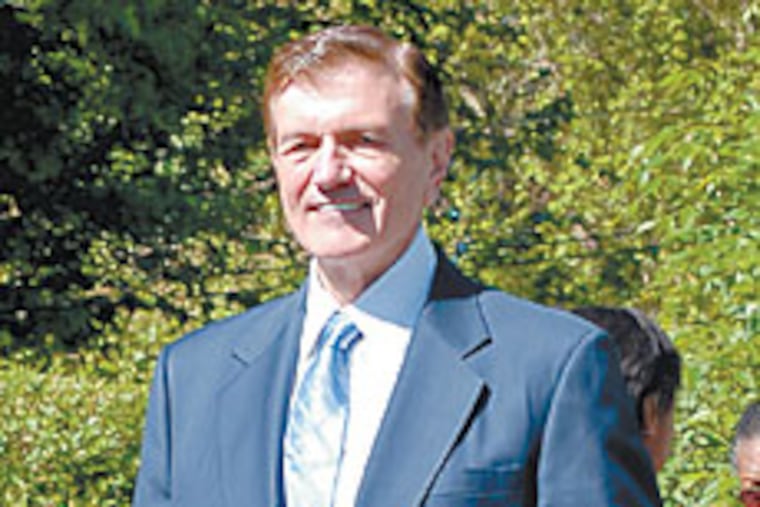Today, the voters decide
Which of the 5 mayoral candidates will be left standing?

It has featured a millionaire spending his millions, a cavalcade of candidate forums, a blizzard of litigation, and a virtual merry-go-round of front-runners.
Today, the race for the Democratic nomination for mayor of Philadelphia ends as voters choose the man who, in all likelihood, will become the city's 98th chief executive.
It is merely, as District Attorney Lynne M. Abraham said yesterday, "one of the most important days in Philadelphia's political life."
Five major candidates have been vying to succeed Mayor Street, spending about $20 million overall on the contest, even with the city's new campaign-money caps in place. In such a crowded field, the nominee could win with fewer than one in four of all votes cast.
City voters will face a long ballot when they go to the polls, which are open from 7 a.m. to 8 p.m.
Besides the mayor's race, the direction of City Council is at stake. While some incumbents may cruise to wins, a few have reason to worry.
A welter of judges is on the ballot. Both major parties are choosing nominees for two state Supreme Court seats, two on Superior Court, four on Philadelphia Common Pleas Court, two on Municipal Court and three on Traffic Court.
And bring your reading glasses: The eight ballot questions range from substantive (should the zoning code be rewritten?) to symbolic (calling for a withdrawal of U.S. troops from Iraq).
The forecast: sunny, very warm, just a chance of rain.
Most of the attention has focused on a mayor's race replete with twists and turns.
An election-eve poll for NBC10 by Survey USA had former Councilman Michael Nutter leading with 36 percent and businessman Tom Knox, the self-financed candidate, at 25 percent. U.S. Rep. Chaka Fattah, an early favorite, was running third with 13 percent. U.S. Rep. Bob Brady, also chairman of the city Democratic party, polled 12 percent, with State Rep. Dwight Evans at 6 percent, and 5 percent undecided.
The poll was based on phone interviews with 560 likely Democratic voters conducted from Friday through Sunday, and had a margin of error plus or minus 4.2 percentage points.
It was the second major poll to show Nutter leading, but previous surveys have detected so much volatility, even among "decided" voters who said they still might change their minds, that much may depend on who does the best job of turning out his supporters today.
In one sense, the primary will test two powers in Philadelphia politics: the Democratic party machine, most of which backs Brady, and Fattah's street organization.
"For years we've heard about the legendary Chaka Fattah election day apparatus," said political consultant Larry Ceisler. "If there's ever been a day in his career for that army to show its worth, it's today."
Whoever wins the Democratic race is likely to be elected mayor in November. Al Taubenberger, head of the Greater Northeast Philadelphia Chamber of Commerce, is unopposed on the Republican ballot, but Philadelphia has not elected a GOP mayor since 1947. Registered Democrats outnumber Republicans by 5-1 in the city.
The at-large Council contest is a free-for-all of 24 candidates seeking five nominations, with a loose slate of reform-minded challengers, and four sons of current and former mayors. Seven of 10 district Council members, including President Anna C. Verna, face credible challenges.
The stakes are just as high for the self-styled reformers, who want to prove they are a force to be reckoned with. "We can build on even just one win," said at-large candidate Marc Stier.
Candidates for the low-profile row offices - sheriff, register of wills, clerk of quarter sessions, and city commissioners - will also be selected today. Democratic Sheriff John Green, a 19-year-incumbent, has the toughest fight, courtesy of real-estate developer Michael Untermeyer.
The mayor's race was the first under the city's 2003 campaign-contribution limits: $5,000 from individuals and $20,000 from political committees. Knox was not subject to the limits because the U.S. Supreme Court has ruled that spending one's own money on a political campaign is free speech.
He has spent an estimated $10 million so far. Knox said Sunday, "I had to give myself an advantage" because each of his opponents had been in politics for decades.
With the outcome seen as uncertain, the drive for money did not let up. Since Saturday alone, more than $82,000 in contributions poured in, more than half of it to Brady, according to finance reports filed with the city. Brady's most recent reports included $20,000 from Verna's campaign, and $5,000 from ward leader Rosanne Pauciello.
Brady also received $10,000 from the Washington-based International Union of Operating Engineers - on the same day one of its Philadelphia locals announced its endorsement of Nutter. Local 835 was the only union to back Nutter.
Fattah, with $211,000 on hand as of April 30, had been struggling to raise funds for months. Records show that in the last 10 days he pulled in an extra $216,000, including $10,000 from Council candidate Sharif Street, and $20,000 from Fattah's congressional campaign fund.
Nutter's list of individual contributors continued to be longer than all his rivals'. He reported receiving $226,000 since last Wednesday.
Abraham said her office would prosecute attempts to interfere with voting, and warned people to abide by limits on politicking in and around polling places. Voters with complaints may call the District Attorney's Office at 215-686-9643.